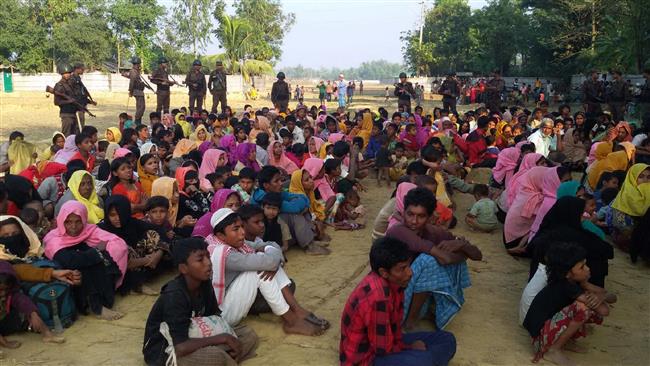
RNA - Coast guard spokesman Sheikh Fakhr Uddin said on Saturday that the deported refugees included women and children who had reported harsh treatment by Myanmar’s security forces and Buddhist vigilante groups.
“We found two injured among 18 men, along with nine women and four children. But we had to send them back,” Fakhr Uddin said, adding that the boat transporting the Rohingya refugees on the Naf river, on the border between Bangladesh and Myanmar, had 31 people on board when it was sent back.
Since a renewed crackdown began against Muslims in Rakhine months ago, the Rohingya have increasingly tried to enter the bordering Cox's Bazar, a district in southeastern Bangladesh where nearly 400,000 refugees are living in squalid camps and makeshift settlements.
Bangladesh has always regretted the increase in arrivals, saying the country is no longer capable of hosting the refugees.
The coast guard’s decision to send back the refugee boat comes after at least 500 Rohingya fled their villages in Rakhine and crossed the border into Cox’s Bazar. It also comes after reports said Myanmar had sent reinforcement to Rakhine, a move which has sparked fresh concerns about more anti-Rohingya violence in the area.
“We have beefed up our patrol on the Naf as (Myanmar) army is gathering in the bordering villages, which may prompt them (Rohingya) to try coming to Bangladesh,” Fakhr Uddin said.
The United Nations has yet to designate Myanmar’s crackdown on Muslims as ethnic cleansing, which the UN says could have been an issue since the arrival of more than 70,000 Rohingya villagers into Bangladesh last October. UN Special Rapporteur Yanghee Lee said recently that he was worried about reports that a Myanmar army battalion had flown into Rakhine to help the local security apparatus, adding that it could trigger more violence and further complicate the situation.
Rohingya Muslims, a community of more than a million people, have been denied citizenship and access to basic rights as the Buddhist-majority country views them as intruders from neighboring Bangladesh. The Rohingya reject claims about their origins and say their ancestors have lived in the area for decades.
847/940